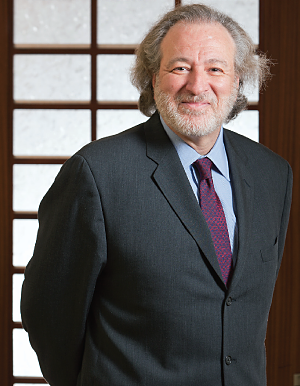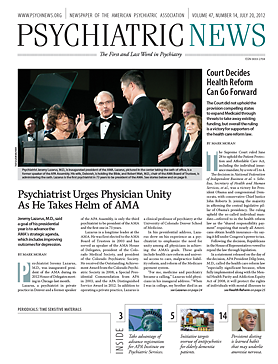A few years ago, a woman dying from a brain tumor wanted to hasten her death because she no longer found any meaning in life. She stood on a highway hoping that a car would run her down, but no driver was willing to do it.
She then contacted Memorial Sloan-Kettering Cancer Center, and a psychiatrist working at the center visited her at home. He tried to find some way of instilling meaning in her life, but to no avail. Finally out of frustration he blurted out, “Well, you can still cry and feel.” She leapt off the couch and cried out, “Yes, I feel so much! I haven’t talked with my children in 20 years. I have grandchildren I have never seen. I can’t die until I reconcile with my children and grandchildren and tell them that I love them.” And that, the psychiatrist recalls, was “the breakthrough.”
The psychiatrist was William Breitbart, M.D., chief of the psychiatry service at Memorial Sloan-Kettering Cancer Center and one of only a handful of psychiatrists in North America who are devoting their professional lives to helping dying patients.
The reason why there are so few of them is due to the challenges that surround this kind of work.
“It’s sad work, it is sometimes really heartbreaking work,” Susan Block, M.D., a professor of psychiatry at Harvard Medical School and chair of palliative care at the Dana-Farber Cancer Institute, told Psychiatric News ( see What Draws Psychiatrists to Palliative Care?). “It is very important that psychiatrists who do this kind of work have support systems and have developed habits of self-care that allow them to be open to the emotional aspects of the work, but not overwhelmed by them.”
Another hurdle, she explained, is exploring patients’ ability to deal with often terrifying end-of-life issues. “It brings you into the realm of dealing with patients’ spiritual beliefs, questions about the meaning of their lives, and concerns about their legacy. … You want to share the realities, but often the realities are quite overwhelming. So trying to help patients make decisions based on realities—that time is getting short, for example—is really a big challenge in the work.”
A third obstacle, she added, is trying to tease out whether it is depression, pain, loss of support, or aspects about the future that prompt some patients to ask for help in ending their lives.
Then there are the particular psychological conditions that dying patients experience for which they need treatment.
“The biggest issue by far is agitation—agitation due to dementia or agitation due to delirium,” Scott Irwin, M.D., Ph.D., chief of psychiatry at the Institute for Palliative Medicine at San Diego Hospice, said in an interview. “It is distressing not just to patients, but to their families and medical staff. … The next most common is anxiety. And the next most common is depression.”
Palliative-care psychiatrists often use the same treatments that psychiatrists employ in other settings—for example, antidepressants for depression or anxiolytic medications for anxiety—to treat dying patients. But they make novel uses of psychotropic medications as well.
For instance, “We use a lot of stimulant drugs to treat fatigue and to treat depression a bit more rapidly, because most typical antidepressants take a few weeks to work,” said Breitbart. “We use the antipsychotic Zyprexa for cancer patients who can’t sleep, who are highly anxious, who have some mood instability, and who are nauseous. And Zyprexa actually potentiates the analgesic effects of opiates.”
“For agitation, if it’s potentially reversible, the gold standard is using an antipsychotic,” Irwin reported. “If it’s agitation due to dementia, there is a lot of debate now about whether antipsychotics are first line. We have chosen to use some other medications like trazadone or gabapentin or beta blockers. But if those don’t work, we’ll often go to antipsychotics as well.”
“We are also experimenting with ketamine,” Irwin continued. “It has been around for a long time as an anesthetic. … Over the last five or seven years, there has been increasing evidence for rapidly treating depression with it. So far, we have given it to about 40 patients, and we see depressive symptoms lift within minutes. … By and large, it works for the majority of patients, with no side effects.”
Moreover, Irwin works with pain specialists, he said, “because we know that if someone is depressed, their pain is harder to treat, and with bad pain, depression is harder to treat. … And I’ll also get involved because pain medications often cause agitation.”
In spite of the psychotherapeutic and psychopharmacological challenges of helping dying patients, the rewards are copious, psychiatrists working in this domain agree.
Irwin noted that people often wonder why he chose to work in a field that often seems difficult and depressing. “To be honest, it is much more uplifting than any other setting I’ve been in,” he explained.
“A big reward is feeling helpful in a phase of life where many professionals fear to go and where patients can feel isolated and alone,” Block said. And she gave an example. A young, dying cancer patient was struggling with a sense of purposelessness. Block invited him to accompany her to teach medical students about patients’ perspectives on illness. He took her up on the offer and was pleased that he could contribute. She also facilitated a dialogue between him and his parents about their feelings for each other. “I think he felt so at peace at having had this conversation,” she said. “It also gave his parents’ enormous comfort after he died.”
Indeed, psychiatrists working in the field would like to encourage other psychiatrists to join their ranks, not just because it is so gratifying, but because “the opportunities for psychiatrists in palliative care are extraordinary,” Harvey Max Chochinov, M.D., Ph.D., a distinguished professor of psychiatry at the University of Manitoba and the Canada Research Chair in Palliative Care, noted (see Dignity Therapy Helps Prepare Patients for Death).
Breitbart concurred: “If you look at the 150 or so palliative-care programs throughout the United States, very few have psychiatrists as part of their teams. There are just too few of us to work in every palliative-care program.”

Dignity Therapy Helps Prepare Patients for Death
A decade or so ago, Harvey Max Chochinov, M.D., Ph.D., a distinguished professor of psychiatry at the University of Manitoba and the Canada Research Chair in Palliative Care, and his colleagues devised a brief psychotherapeutic intervention called Dignity Therapy. It helps dying patients who are experiencing a lost sense of self to express thoughts, wishes, reminiscences, and hopes for loved ones.
“To date, our group has conducted several studies of Dignity Therapy,” Chochinov told Psychiatric News. “One was a phase-1 trial conducted in Canada and Australia in which we showed that it had great promise and that the vast majority of patients experienced not only a sense of satisfaction, but an enhanced sense of meaning regarding their lives, helping them prepare for death. Then we conducted a study to determine how family members of patients who had received Dignity Therapy rated the therapy, and almost all said that Dignity Therapy provided comfort during the course of their bereavement and that it was something that they would recommend to other terminally ill patients and their family members. More recently we have finished and published the results of a randomized, controlled study of Dignity Therapy, where we have found that it was able to enhance the end-of-life experience.”
The therapy is also being studied in Australia, Denmark, England, Scotland, and Sweden and is being used in clinical settings in various countries, including in the United States at the San Diego Hospice. “We also hold Dignity Therapy workshops in various palliative-care centers around the world,” Chochinov said. He has written a book about his method titled Dignity Therapy: Final Words for Final Days (Oxford University Press).
What Draws Psychiatrists to Palliative Care?
“I am a child of Holocaust survivors,” William Breitbart, M.D., chief of the psychiatry service at Memorial Sloan-Kettering Cancer Center, said during a recent interview. “I grew up in an environment where I was surrounded by death and loss, but also courage and that spark of life that drives the will to live. I was interested in medicine, I was interested in psychiatry, but what most interested me was the human experience of being mortal—that nexus between life and death. I wanted to understand the experience of human beings confronting mortality.”
“I got interested in working with patients at the end of life when I was a resident, which was more than 30 years ago,” said Susan Block, M.D., a professor of psychiatry at Harvard Medical School and chair of palliative care at the Dana-Farber Cancer Institute. “As part of my first job out of my training, having trained in both internal medicine and psychiatry, I had a part-time role as a hospice medical director … helping patients and their families through this often overwhelming crisis period in their lives. … Then I got interested in education on end-of-life care. Then I moved, during the 1990s, into helping build the field of palliative care.”

